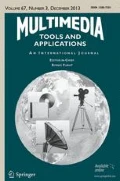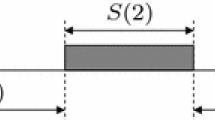Abstract
Resource management offers Quality-of-Service reliability for time-critical continuous-media applications. Currently, existing resource management systems in the Internet and ATM domain only provide means to reserve resources starting with the reservation attempt and lasting for an unspecified duration. However, for several applications such as video conferencing, the ability to reserve the required resources in advance is of great advantage. This paper outlines a new model for resource reservation in advance. We identify and discuss issues to be resolved for allowing resource reservation in advance. We show how the resource reservation in advance scheme can be embedded in a general architecture and describe the design and implementation of a resource management system providing reservation in advance functionality.
Similar content being viewed by others
References
A. Banerjea, D. Ferrari, B.A. Mark, and M. Moran, “The Tenet Real-Time Protocol Suite: Design, Implementation, and Experiences,” Technical Report TR-94-059, International Computer Science Institute, Berkeley, CA, USA, Nov. 1994.
A. Campbell, G. Coulson, and D. Hutchinson, “A quality of service architecture,” ACM Computer Communication Review, Vol. 24, No. 2, pp. 6–27, April 1994.
Y.-H. Chang, “Network support for a multimedia conference scheduling service,” Proceedings of SPIE, 1994, Vol. 2188, pp. 109–119.
D. Clark, S. Shenker, and L. Zhang, “Supporting real-time applications in an integrated packet services network: Architecture and mechanisms,” SIGCOMM 1992.
M. Degermark, T. Köhler, S. Pink, and O. Schel'n, “Advance reservation for predicted service,” Fifth International Workshop on Network and Operating System Support for Digital Audio and Video, Durham, NH, USA, April 19- 21, 1995.
L. Delgrossi and L. Berger (Eds.), “Internet STream protocol version 2 (ST2)—Protocol specification—Version ST2C,” Internet RFC 1819, Aug. 1995.
D. Ferrari, A. Banerjea, and H. Zhang, “Network Support for Multimedia: A Discussion of the Tenet Approach,” Technical Report TR-92-072, International Computer Science Institute, Berkeley, CA, USA, Oct. 1992.
D. Ferrari, J. Ramaekers, and G. Ventre: “Client-network interactions in quality of service communication environments,” Proceedings of the Fourth IFIP Conference on High Performance Networking, University Liege, Belgium, Dec. 1992, pp. E1-1–E1-14.
D. Ferrari, A. Gupta, and G. Ventre, “Distributed advance reservation of real-time connections,” Fifth International Workshop on Network and Operating System Support for Digital Audio and Video, Durham, NH, USA, April 19- 21, 1995.
S. Jamin, D. Clark, S. Shenker, and L. Zhang, “Admission control algorithm for predictive real-time service,” Third International Workshop on Network and Operating System Support for Digital Audio and Video, San Diego, CA, USA, Nov. 1992.
C.L. Liu and J.W. Layland: “Scheduling algorithms for multiprogramming in a hard real-time environment,” Journal of the ACM, Vol. 20, No. 1, pp. 47–61, Jan. 1973.
K. Nahrstedt and R. Steinmetz: “Resource management in networked multimedia systems,” IEEE Computer, Vol. 28, No. 4, April 1995.
W. Reinhardt, “Advance reservation of network resources for multimedia applications,” Proceedings of the Second International Workshop on Advanced Teleservices and High-Speed Communication Architectures, Heidelberg, Germany, Sept. 26- 28, 1994.
W. Reinhardt, “Advance resource reservation and its impact on reservation protocols,” Proceedings of Broadband Island '95, Dublin, Ireland, Sept. 1995.
J.W. Roberts and K. Liao: “Traffic models for telecommunication services with advance capacity reservation,” Computer Networks and ISDN Systems, No. 10, pp. 221–229, 1985.
R. Steinmetz, “Human perception of jitter and media synchronisation,” IEEE Journal on Selected Areas in Communications, Vol. 14, No. 1, pp. 61–72, Jan. 1996.
C. Topolcic, “Experimental internet stream protocol, versi on 2 (ST-II),” Internet RFC 1190, Oct. 1990.
C. Vogt, R.G. Herrtwich, and R. Nagarajan, “HeiRAT: The Heidelberg resource administration technique—design philosophy and goals,” Kommunikation in Verteilten Systemen, Munich, Germany, Mar. 3- 5, 1993.
C. Vogt, L.C. Wolf, R.G. Herrtwich, and H. Wittig: “HeiRAT—quality-of-service management for distributed multimedia systems,” to appear in ACM Multimedia Systems Journal—Special Issue on QoS Systems.
L.C. Wolf, L. Delgrossi, R. Steinmetz, S. Schaller, and H. Wittig: “Issues of reserving resources in advance,” Fifth International Workshop on Network and Operating System Support for Digital Audio and Video, Durham, NH, USA, April 19- 21, 1995.
L.C. Wolf, Resource Management for Distributed Distributed Multimedia Systems, Kluwer, 1996.
L. Zhang, S. Deering, D. Estrin, S. Shenker, and D. Zappala, “ RSVP: A new resource reservation protocol,” IEEE Network, pp. 8–18, Sept. 1993.
Author information
Authors and Affiliations
Rights and permissions
About this article
Cite this article
Wolf, L.C., Steinmetz, R. Concepts for Resource Reservation in Advance. Multimedia Tools and Applications 4, 255–278 (1997). https://doi.org/10.1023/A:1009684906050
Issue Date:
DOI: https://doi.org/10.1023/A:1009684906050




